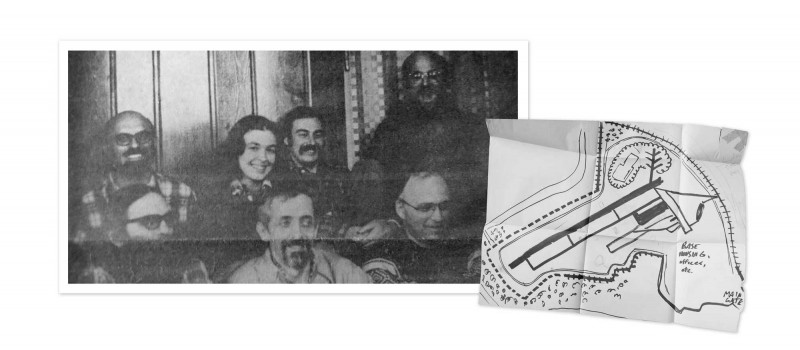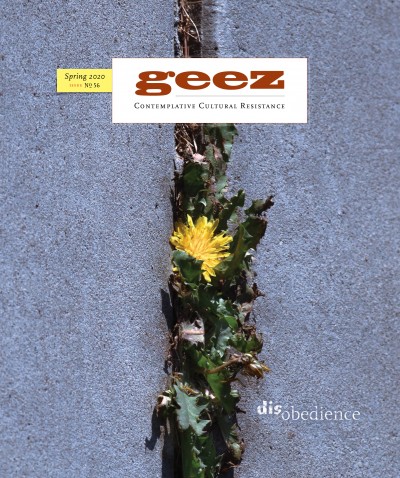Eucharist at Gunpoint

The seven activists who crashed the Wurtsmith Airbase on Easter morning in 1982 Credit: Photo by Jeanie Wylie-Kellermann, map by Bill Wylie-Kellermann
To be honest, much of what I know about spiritual and vocational discernment I’ve learned from the process of planning non-violent, liturgical, direct actions of civil resistance. Let me tell a personal story, not altogether flattering, to frame some observations.
In 1982, a group of us who had already been engaging in anti-nuclear resistance came together. Just two years prior, the first “ploughshares action” had taken place when eight friends entered a General Electric plant in Pennsylvania and used blood and hammers to damage or “convert” a Mark 12A nuclear warhead. Their deed, enacting Isaiah’s call to beat swords into ploughshares, had sparked a movement – and we were prepared to consider if and how we might join it.
We began a year-long series of monthly weekend retreats in different locations around the U.S. Midwest to contemplate a time and place to act. Those retreats consisted of prayer, Bible study, community building, and reading the signs of the times, each of which offered opportunity to “listen for the Word.”
Intercession as Word? For whom are we praying and so, by extension, for whom and where and how are we to act? Eventually we would make an “altar cloth” to be used in the action liturgy, writing upon it the names of individuals and communities, even nations, on whose behalf we acted.
This moveable retreat ‒– Wisconsin, southern Illinois, Michigan – enabled us to meet close to a military base or weapons manufacturing facility. There was a practical matter of scoping out prospects and reconnoitering the landscape, but that joined with a spiritual task of listening. Were our hearts pulled to this place?
Reading together the signs of the times influenced our sense of location. At that moment the cruise missile, a versatile first-strike weapon, was being forward-based in Europe and the Women of Greenham Common were engaging in an ongoing encampment. Meanwhile, the cruise was just then being mounted on B-52s at Wurtsmith Air Force Base in northern Michigan, rendering an otherwise “deterrent weapon” first-strike capable. So the times commended the place.
As a gift of the Spirit, I comprehend discernment to be essentially communal – not only best undertaken in community, but for its wider sake. For example, we made confession to one another, including confessing our fears. When fears are silenced, they hold us back. Yet often as not, the very things we fear are what we’re called to do. Kept inside they rule us, working in the service of the powers. Confessed into the light of community they can be freed in the service of the Spirit.
Conscience, call it a charismatic gift, may indeed be found in solitary discernment, but it’s certainly best nourished and tested in communal spirituality.
Naming fears necessarily points to the principalities and powers with whom we struggle. The Law, as such, is among them. The power of death, primarily in the form of imprisonment, but even execution, stands behind its dictates. To break the law conscientiously entails discerning its spirit, and facing the threat. In a Birmingham jail cell, Martin Luther King, Jr. struggled to articulate this discernment. How do we distinguish, say, between a just law which merits our obedience and an unjust law which conscience requires be broken? How do we recognize when a law, otherwise just on the face of it, is being applied unjustly? In our case, how does the law enable and protect nuclear devastation? Is the law serving community and creation, or destroying them?
In these retreats, Bible study figured into this process. We had, of course, attended to Isaiah 4 and the beating of swords into ploughshares. But as the liturgical year turned before us, we began to read together some of the Easter lections – and here made a remarkable discovery. After the crucifixion of Jesus, by Matthew’s account (27:62f), the religious authorities remember what the disciples so quickly forgot: the promise of resurrection. They suffer a great anxiety that, by one means or another, he might not stay put, and so they appeal to the Governor. Pilate, in response, provides a guard of soldiers and “makes the sepulcher secure by sealing the stone.” This seal is a legal matter. Cords would be drawn across the stone and anchored with clay. The clay (see Daniel 6:17) could be impressed with an official signet. To move the stone would indicate tampering. To break the official seal would be a civil offence. Resurrection is against the law.
I have a vivid memory of the moment when Tom Lumpkin of the Detroit Catholic Worker said, “What I would like to do is celebrate the Easter Vigil Liturgy walking onto the base.” There was almost an audible thump in my own chest, one I swear could be heard in others around the circle. We all knew a plan was set.
When the pre-dawn moment came, we lit the paschal candle and cut the barbed wire fence, breaking the seal of legal security and so proclaiming resurrection freedom from the power of death. But first there was another discernment to endure. We had resolved, and would eventually succeed, in walking several miles of runway to the open gates of the deadly-force high-security area filled with cruise-missile-armed B52s. Is this a place, I asked, we want to begin swinging hammers? Over several weeks, a heavy debate ensued among us.
I corresponded with two mentors, both from the original Ploughshares action. A letter came back, first somewhat zen in the manner of read-your-own-heart-in-these-lines, but then actually coming down in line with my concerns. Two others from that original group made a trek west to join our retreat, opening the Book with us to Isaiah 4. But now I was beginning to dig in my spiritual heels. I don’t recall being the sole voice blocking consensual discernment, but I led it. Now convicted that swinging hammers in a deadly force zone was an invitation to violence.
Larry Rosebaugh, a truly great soul among us, a veteran of conscientious life and action, made a final attempt. He hand carved a hammer after the fashion of an Indigenous tool. Couldn’t we carry it along with the intent of beating the nuclear swords to ploughshares? But I had become intractable. No supple listening heart, but rigid in righteousness. I feel now, and here confess, that I blocked genuine discernment. Thwarting, perhaps, the Holy Spirit herself.
This to say that spiritual and political discernment is not a tidy process. Actually quite messy – listening for the divine in the stuff of the human. Its community dimension is so crucial precisely because it can be fraught with ego or worse. In the end you just have to trust it to God and together do the deed.
Our action turned out true and beautiful. The Spirit does not abandon us. Half-way down the runway we renewed our baptismal vows, looking toward the bombers while “renouncing Satan and all his works.” At the open gate of the high security area, we spread the intercessory altar cloth, scattered vials of our own blood in the name of the Lamb, and partook Eucharist at gun point surrounded by military vehicles. Outside, at churches and the front gatehouse, friends distributed our leaflet:
We believe that human beings (so says Easter), are free from the power of death in all its forms and delivery systems. We’re not in bondage to these weapons. We are truly and fully free to unmake them. Now . . . this very morning. We believe that God who raised Christ from the dead will also quicken our imaginations, and thereby our bodies and lives. We believe this is the meaning of the resurrection.
Or so we had discerned. Thanks be to God.
Bill Wylie-Kellermann is a writer, activist, and pastor from Detroit, Michigan.
Photo credit: The seven activists who crashed the Wurtsmith Airbase on Easter morning in 1982. Photo: Jeanie Wylie-Kellermann, The Michigan Voice, Map: Bill Wylie-Kellermann.



Start the Discussion